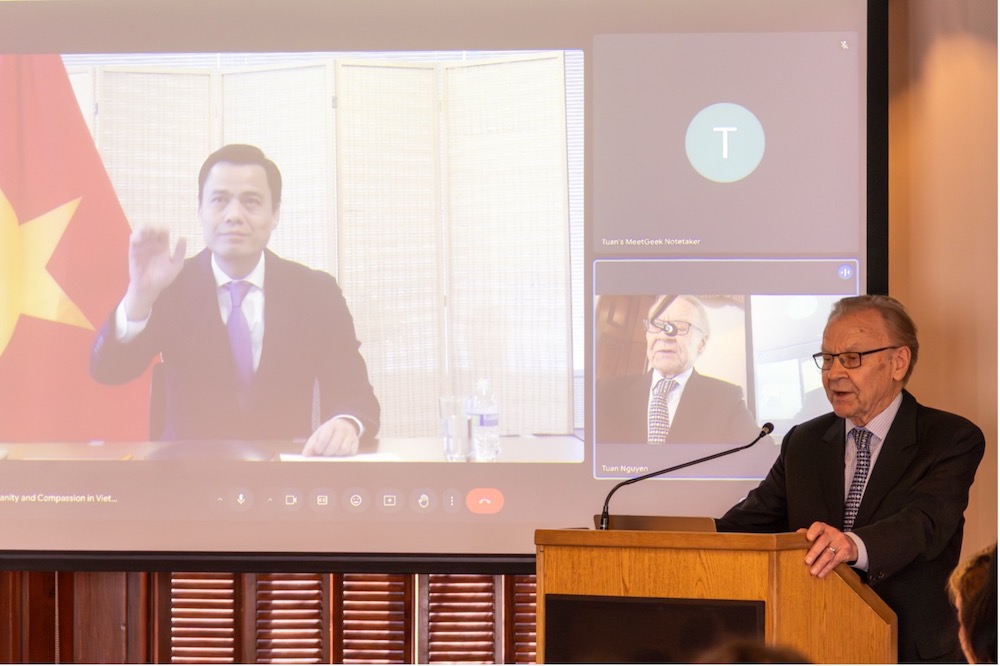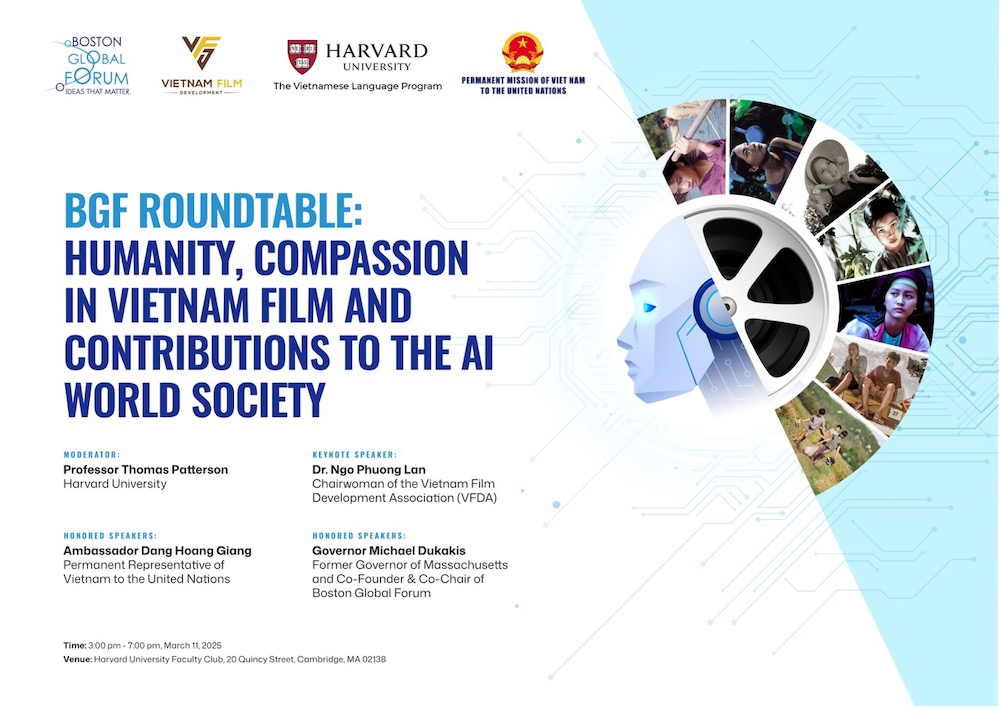March 11, 2025
Honorable Governor Dukakis,
Distinguished Dr. Ngo Phuong Lan, Professor Thomas Patterson,
Excellencies, Ladies and Gentlemen,
- It is a true honor for me to represent the Diplomatic Missions of Viet Nam in the United States at this remarkable event. The Permanent Mission of Viet Nam in New York is delighted to collaborate with the Boston Global Forum and Harvard University in convening this meaningful roundtable, which brings together thought leaders and creative minds to explore the intersection of film, humanity, technology and international cooperation.
- As Viet Nam and the United States are celebrating 30 years of normalized diplomatic relations in 2025, we recognize the unique role of cinema in fostering mutual understanding and cultural exchange between our two nations. Today’s gathering is a testament to our growing comprehensive strategic partneship, deepening cultural and people-to-people ties, as well as the vast potential for greater collaboration in the film industry and beyond.
Excellencies, distinguished participants,
- Since its inception dating back to the early 20th century, Vietnamese cinema has been a mirror to the country’s history, and a canvas for the soul of its people. Vietnamese film has captured the resilience of our nation and the depth of our compassion and shared humanity. From the poetic realism of wartime narratives to the contemporary explorations of identity, love, and change, our filmmakers have crafted stories that resonate not only with Vietnamese audiences but also with the world.
- As the country embarked on a path of comprehensive renovation and international integration over the past 4 decades, the Vietnamese film industry has evolved and transformed itself significantly. Despite the challenges of an economy in transition, Vietnamese filmmakers have managed to preserve the artistic integrity of “made in Viet Nam” films while also achieving increasing commercial success.
Today, the local film market is thriving, driven by a young and increasingly discerning audience. Several domestic films have grossed over 20 million US dollars, outperforming even foreign blockbusters released during the same period. Besides success at home, Vietnamese films are also gaining international recognition, making frequent appearances at prestigious film festivals world wide.
- In that evolution, especially since the turn of this century, the impacts of the unique historical connection and deepening relations between Viet Nam and the United States are clearly evident:
– Many Vietnamese filmmakers of the post-war generation, born in the 1970s and 1980s, became exposed to and found inspiration in the acclaimed cinematic masterpieces from the United States.
– A generation of Vietnamese-American directors have returned to Viet Nam, bringing with them the knowledge and know-how from Hollywood, including notable names such as Charlie Nguyen, Johnny Tri Nguyen, and Victor Vu…
Others, like Tony Bui, have built successful careers in the U.S. while remaining dedicated to bridging the two countries through art and film.
– Our strengthened bilateral cooperation and exchange of scholarships have nurtured a new wave of young US-educated filmmakers. Talents such as Phan Gia Nhat Linh, Trinh Dinh Le Minh, and Vu Quynh Ha, have returned and become key figures in Viet Nam’s modern film industry.
- Those are just a few examples of the deep-rooted connections and immense potential for cooperation between Viet Nam and the United States in the film industry. More than a professional partnership, this collaboration also serves as a bridge that fosters empathy, understanding, and shared creative aspirations.
Excellencies, distinguished participants,
- As artificial intelligence is transforming virtually all aspects of life, the film industries in both the U.S. and Viet Nam are at a critical crossroad. The “AI age” presents both unprecedented opportunities and profound challenges. It is essential that we ensure technology amplifies humanistic values rather than diminish them. AI should support artists and enhance their ability to tell stories that move, inspire, and unite us. It must not take away the emotional depth, cultural authenticity, and human connections that make cinema so powerful.
These are issues that require thoughtful exploration. I, therefore, look forward to an insightful discussion in the next hours, hoping it will inspire new ideas, meaningful collaborations, and a future where film and technology coexist in harmony.
- Finally, I take this opportunity to I extend my heartfelt gratitude to all our esteemed speakers, panelists and participants for bringing their expertise, vision, and passion to this conversation. My special thanks go to the visiting delegation of Vietnamese film professionals, headed by Dr. Ngo Phuong Lan, a prominent critic and leader in Viet Nam’s film industry.
Thank you all for your kind attention.

